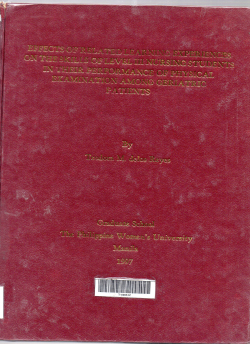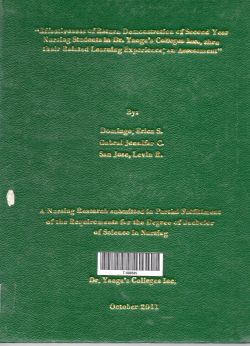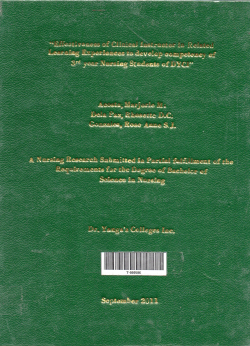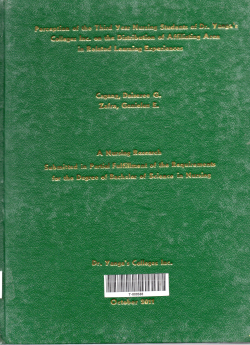EFFECTS OF RELATED LEARNING EXPERIENCES ON THE SKILLS OF LEVEL III NURSING STUDENTS IN THEIR PERFORMANCE OF PHYSICAL EXAMINATION AMONG GERIATRIC PATIENTS

Type
Thesis
Authors
Category
CHS
[ Browse Items ]
Subject
geriatric patients;leaning experiences on the skills of leve II nursing students
Abstract
The study sought to find out the effect of related learning experience on the skills of Level III nursing students in their performance of physical examination on geriatric patients. It was specifically undertaken because the researcher believed that nursing students today are experiencing new developments in the field of basic knowledge and clinical practice. The appearance of new geriatric concepts has created a large demand for nurses to be equipped with the proper skills towards health promotion and disease prevention. The presence of very few materials on this topic plus the need to evaluate and examine the current status of related learning experience
—— whether it served its purpose of acquiring the needed skills towards the performance of various nursing activities particularly in the area of physical examination among geriatric patients -- greatly influenced the researcher in pursuing the study.
8. Statement of the Problem
The study aimed to determine the effects of related learning experience on the skills of level III nursing students in their performance of physical examination on geriatric patients.
Specifically, it attempted to answer the following questions:
81 What are the skills of the control group of
level III nursing students in their
performance of physical examination among geriatric patients before the implementation of related learning experience?
8.2 What are the skills of the experimental group of level III nursing students in their performance of physical examination among geriatric patients after the implementation of the related learning experience?8.3 Is there a significant difference in the
performance of’ physical examination skills
among the experimental and control groups of
level III nursing students?
9- Research Design
The research employed the non—equivalent control group design which falls under the quasi- experimental research designs. Two (2) groups were utilized namely the non-equivalent control group and the experimental group. The experimental group were given the independent (x) variable of related learning activities (RLA) specifically the feedback and reinforcement lecture. Later two tests (pre and post test) were given to both groups as a measure of change and as basis for comparison. The pre—test was used as a means by which the entry level skills of the students were measured while the post—test was used to measure the terminal level skills of the students after the implementation of the related learning activities.
The null hypothesis formulated were:There is no significant difference in the performance of physical examination skills among the experimental and control groups of level III nursing students.
9.2 There is no significant difference between
the pre—test scores and post—test scores of
the control group in their performance of
physical examination skills.
9.3 There is no significant difference between the pre—test scores and post—test scores of the experimental group in their performance of physical examination skills.
9.4 There is no significant difference between the pre-test scores and post—test score
—— whether it served its purpose of acquiring the needed skills towards the performance of various nursing activities particularly in the area of physical examination among geriatric patients -- greatly influenced the researcher in pursuing the study.
8. Statement of the Problem
The study aimed to determine the effects of related learning experience on the skills of level III nursing students in their performance of physical examination on geriatric patients.
Specifically, it attempted to answer the following questions:
81 What are the skills of the control group of
level III nursing students in their
performance of physical examination among geriatric patients before the implementation of related learning experience?
8.2 What are the skills of the experimental group of level III nursing students in their performance of physical examination among geriatric patients after the implementation of the related learning experience?8.3 Is there a significant difference in the
performance of’ physical examination skills
among the experimental and control groups of
level III nursing students?
9- Research Design
The research employed the non—equivalent control group design which falls under the quasi- experimental research designs. Two (2) groups were utilized namely the non-equivalent control group and the experimental group. The experimental group were given the independent (x) variable of related learning activities (RLA) specifically the feedback and reinforcement lecture. Later two tests (pre and post test) were given to both groups as a measure of change and as basis for comparison. The pre—test was used as a means by which the entry level skills of the students were measured while the post—test was used to measure the terminal level skills of the students after the implementation of the related learning activities.
The null hypothesis formulated were:There is no significant difference in the performance of physical examination skills among the experimental and control groups of level III nursing students.
9.2 There is no significant difference between
the pre—test scores and post—test scores of
the control group in their performance of
physical examination skills.
9.3 There is no significant difference between the pre—test scores and post—test scores of the experimental group in their performance of physical examination skills.
9.4 There is no significant difference between the pre-test scores and post—test score
Number of Copies
1
| Library | Accession No | Call No | Copy No | Edition | Location | Availability |
|---|---|---|---|---|---|---|
| Main | 17 | T Ef36 1997 | 1 | Yes |



